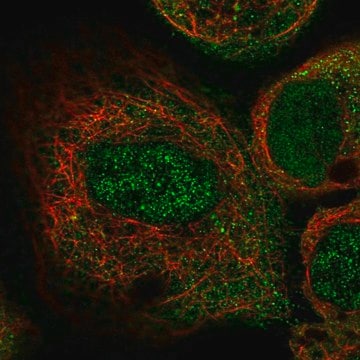MABT162
Anti-Pinch-1 Antibody, clone 9D2.1
clone 9D2.1, from mouse
Synonim(y):
LIM and senescent cell antigen-like-containing domain protein 1, Particularly interesting new Cys-His protein 1, PINCH-1, Renal carcinoma antigen NY-REN-48
About This Item
Polecane produkty
pochodzenie biologiczne
mouse
Poziom jakości
forma przeciwciała
purified immunoglobulin
rodzaj przeciwciała
primary antibodies
klon
9D2.1, monoclonal
reaktywność gatunkowa
human, mouse
metody
immunohistochemistry: suitable
western blot: suitable
izotyp
IgMκ
numer dostępu NCBI
numer dostępu UniProt
Warunki transportu
wet ice
docelowa modyfikacja potranslacyjna
unmodified
informacje o genach
human ... LIMS1(3987)
Opis ogólny
Immunogen
Zastosowanie
Cell Structure
Adhesion (CAMs)
Jakość
Western Blotting Analysis: 0.5 µg/mL of this antibody detected Pinch-1 in 10 µg of human heart tissue lysate.
Opis wartości docelowych
Postać fizyczna
Przechowywanie i stabilność
Komentarz do analizy
Human heart tissue lysate
Inne uwagi
Oświadczenie o zrzeczeniu się odpowiedzialności
Nie możesz znaleźć właściwego produktu?
Wypróbuj nasz Narzędzie selektora produktów.
Kod klasy składowania
10 - Combustible liquids
Klasa zagrożenia wodnego (WGK)
WGK 2
Temperatura zapłonu (°F)
Not applicable
Temperatura zapłonu (°C)
Not applicable
Certyfikaty analizy (CoA)
Poszukaj Certyfikaty analizy (CoA), wpisując numer partii/serii produktów. Numery serii i partii można znaleźć na etykiecie produktu po słowach „seria” lub „partia”.
Masz już ten produkt?
Dokumenty związane z niedawno zakupionymi produktami zostały zamieszczone w Bibliotece dokumentów.
Nasz zespół naukowców ma doświadczenie we wszystkich obszarach badań, w tym w naukach przyrodniczych, materiałoznawstwie, syntezie chemicznej, chromatografii, analityce i wielu innych dziedzinach.
Skontaktuj się z zespołem ds. pomocy technicznej








